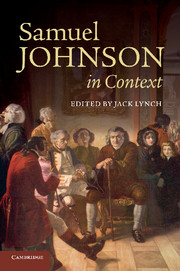Book contents
- Frontmatter
- Contents
- Illustrations
- Contributors
- Preface
- Chronology
- Abbreviations
- Part I Life and works
- Part II Critical fortunes
- Part III Contexts
- Chapter 10 America
- Chapter 11 Anglicanism
- Chapter 12 Anthropology
- Chapter 13 Authorship
- Chapter 14 Biography
- Chapter 15 Book trade
- Chapter 16 Clubs
- Chapter 17 Conversation
- Chapter 18 Dictionaries
- Chapter 19 Domestic life
- Chapter 20 Education
- Chapter 21 Empire
- Chapter 22 Essays
- Chapter 23 Fiction
- Chapter 24 History
- Chapter 25 Journalism
- Chapter 26 Law
- Chapter 27 Literary criticism
- Chapter 28 London
- Chapter 29 Medicine
- Chapter 30 Mental health
- Chapter 31 Money
- Chapter 32 Nationalism
- Chapter 33 Philosophy
- Chapter 34 Poetry
- Chapter 35 Politics
- Chapter 36 Scholarship
- Chapter 37 Science and technology
- Chapter 38 Scotland
- Chapter 39 Sermons
- Chapter 40 Shakespeare
- Chapter 41 Slavery and abolition
- Chapter 42 Social hierarchy
- Chapter 43 Theatre
- Chapter 44 Travel
- Chapter 45 Visual arts
- Chapter 46 War
- Chapter 47 Women writers
- Further reading
- Index
Chapter 14 - Biography
from Part III - Contexts
Published online by Cambridge University Press: 05 June 2012
- Frontmatter
- Contents
- Illustrations
- Contributors
- Preface
- Chronology
- Abbreviations
- Part I Life and works
- Part II Critical fortunes
- Part III Contexts
- Chapter 10 America
- Chapter 11 Anglicanism
- Chapter 12 Anthropology
- Chapter 13 Authorship
- Chapter 14 Biography
- Chapter 15 Book trade
- Chapter 16 Clubs
- Chapter 17 Conversation
- Chapter 18 Dictionaries
- Chapter 19 Domestic life
- Chapter 20 Education
- Chapter 21 Empire
- Chapter 22 Essays
- Chapter 23 Fiction
- Chapter 24 History
- Chapter 25 Journalism
- Chapter 26 Law
- Chapter 27 Literary criticism
- Chapter 28 London
- Chapter 29 Medicine
- Chapter 30 Mental health
- Chapter 31 Money
- Chapter 32 Nationalism
- Chapter 33 Philosophy
- Chapter 34 Poetry
- Chapter 35 Politics
- Chapter 36 Scholarship
- Chapter 37 Science and technology
- Chapter 38 Scotland
- Chapter 39 Sermons
- Chapter 40 Shakespeare
- Chapter 41 Slavery and abolition
- Chapter 42 Social hierarchy
- Chapter 43 Theatre
- Chapter 44 Travel
- Chapter 45 Visual arts
- Chapter 46 War
- Chapter 47 Women writers
- Further reading
- Index
Summary
Bio′graphy. n.s. [βίος and γράϕω.]
In writing the lives of men, which is called biography, some authors place every thing in the precise order of time when it occurred. Watts’s Logick.
Of the various realms of learning enriched by Johnson and the various good reasons that we have for valuing him, his contributions to biography rank at or near the top of the scale. Himself the author of the most influential literary biographies and the most respected commentary on biography ever written in English, he was also the subject of the uncontested (though perennially controversial) leader among British biographies. But the superlatives that we use to describe Johnson’s place in the history of biography should not blind us to the contexts that produced his essays on biography in the Rambler and the Idler in the 1750s, his Lives of the Poets (1779–81), and Boswell’s Life (1791). These are great works, but they are not incomparable, and it is no diminution of their greatness to see how they arose out of, and fed into, the popular literature of their time. Johnson could no more have written his essays without having had plenty of examples to think about than Aristotle could have composed his Poetics without a dramatic tradition to draw on. Nor would Johnson and Boswell have struggled as they did with their biographical works, or their publishers have put up with their repeated failures to meet deadlines, if they had not been confident about finding an appreciative audience.
Backgrounds
The deep history of biography, or accounts of the lives of individuals, stretches back as far as we can see. The first subjects were holy men, their lives held up as models of goodness and they themselves as objects of reverence: this is the tradition that is described as “hagiographical,” now usually with implicit disparagement, though the term ought to be neutral and the type is still prevalent. The hagiographic treatment was soon extended from prophets, saints (women found an opportunity here), and churchmen to secular figures – great rulers and statesmen, military leaders, and others – whose lives affected the welfare of nations. The second-century Greek biographer Plutarch set the standard in his Lives of the Emperors and Parallel Lives. High achievers in other fields were added gradually, philosophers being among the first of them, thanks to the efforts of Diogenes Laertius in the first century – and “philosopher” came to be an elastic term that could include scholars and thinkers more generally. Although Boswell begins the Life of Johnson by praising Johnson’s achievements in biography, the real justification was his status as the learned “philosopher” who had produced the Rambler and the Dictionary (Boswell, Life, 1:25). Writers were paid tribute in biographical prefaces to their collected works from early on, but the tribute was applied sparingly, and mainly to poets. (Johnson’s Lives of the Poets were originally commissioned as a series of such prefaces, intended to be dispersed among the volumes of a large edition.) Biographies reflect the values of the societies for which they are produced as well as the state of the genre at a given moment, and the range of possibility was by our lights relatively restricted in the eighteenth century.
- Type
- Chapter
- Information
- Samuel Johnson in Context , pp. 127 - 133Publisher: Cambridge University PressPrint publication year: 2011



